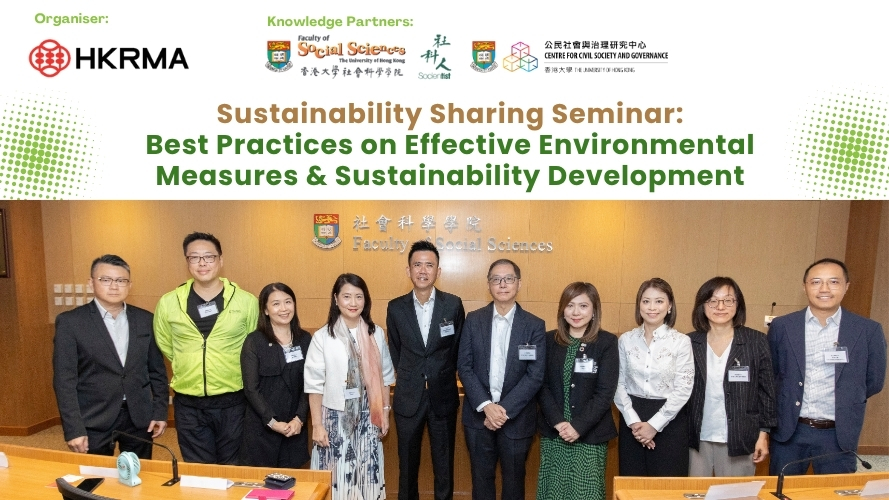Environmental, Social, and Governance (ESG) considerations are rapidly reshaping the retail landscape across Asia Pacific, driven by evolving consumer expectations and mounting environmental challenges. According to the KPMG GS1 Navigating the Future of Seamless Commerce in Asia Pacific (2024) report[1], only 11% of consumers in 14 Asia-Pacific markets stated that sustainability does not influence their purchasing decisions. The majority actively seek brands with clear sustainability commitments—53% are more likely to choose sustainable products, while significant proportions prioritize waste reduction through recycling (49%), sustainable sourcing of raw materials (31%), and eco-friendly packaging (30%). Additionally, 28% value brands with robust climate action or net-zero strategies, and 22% are concerned with fair labour practices, underscoring ESG as a critical factor in consumer choice.
To accelerate ESG progress and foster collaboration, the Hong Kong Retail Management Association (HKRMA), the Faculty of Social Sciences (FOSS) at The University of Hong Kong (HKU), and the Centre for Civil Society and Governance, HKU, co-hosted the Sustainability Sharing Seminar on 21 October 2025. The event convened over 60 sustainability practitioners from 26 leading corporations, SMEs, and non-profit organizations across the retail value chain, providing a dynamic platform for industry dialogue, knowledge exchange, and cross-sector collaboration to advance ESG transformation in Hong Kong’s retail industry.
A Glimpse of Corporate Insights
Six esteemed speakers shared their sustainability journeys, offering diverse insights from across the retail landscape. Jane Tong (Giormani), Miko Cheung (LAWSGROUP), Ophelia Lin (Meiriki Japan), Kim Siu (Watsons Water), and Joyce Chiu (Café de Coral) discussed how their companies are weaving sustainability into their strategic DNA. Their approaches emphasize building resilient, future-ready business models that address evolving ESG reporting requirements, growing demand for supply chain transparency, and shifting consumer expectations.
Highlights of their strategies include:
- Championing repair, refurbishment and upcycling to extend product lifespan, promote resource circularity, create new revenue streams, and enhance customer loyalty;
- Adopting eco-friendly materials and minimalist packaging to reduce waste while ensuring product protection;
- Integrating employee wellbeing initiatives to boost productivity and support sustainable organisational growth;
- Fostering youth entrepreneurship and innovation for broader societal impact;
- Communicating compelling sustainability narratives to stakeholders—including senior management, suppliers, and employees—to align strategic vision, shared purpose, and mutual benefits to galvanise collective action.
Complementing these industry perspectives, Elsa Lam from the FOSS’ Experiential Learning Team provided an academic viewpoint on talent development. She underscored the transformative power of experiential learning to bridge knowledge gaps, cultivate critical skills, and prepare the next generation of sustainability leaders—illustrating the vital synergy between academia and industry in advancing ESG capacity.
Panel Discussion: Key Takeaways
The panel discussion distilled several actionable insights:
- Governance from the Inside Out: Robust governance is fundamental to sustainable success, requiring cross-departmental collaboration and active staff engagement.
- ESG as Corporate DNA: Sustainability must be embedded in company values, operations, and culture, not treated as an add-on. Purpose-driven management is essential, aligning actions with the company’s mission and addressing broader societal challenges.
- Commercialising Sustainability: Aligning sustainable practices with market needs transforms environmental and social responsibility into business advantage. Companies can build strong brands, enhance efficiency, and develop circular products and services for new revenue streams and competitive edge.
- Two-Way Talent Development: Mutual learning between managers and interns fosters a vibrant sustainability culture. Internships serve as practical training for emerging talent, while managers benefit from fresh perspectives, driving innovation and engagement.
Looking Ahead
The seminar concluded with renewed optimism and commitment to translating ESG ambitions into impactful action. As Hong Kong’s retail sector advances its sustainability journey, continued collaboration between industry and academia will be essential for fostering a greener, more resilient future.
References:
KPMG. (2024). Navigating the future of seamless commerce in Asia Pacific. https://assets.kpmg.com/content/dam/kpmgsites/xx/pdf/2024/06/navigating-the-future-of-seamless-commerce-in-asia-pacific.pdf
Category : Event

